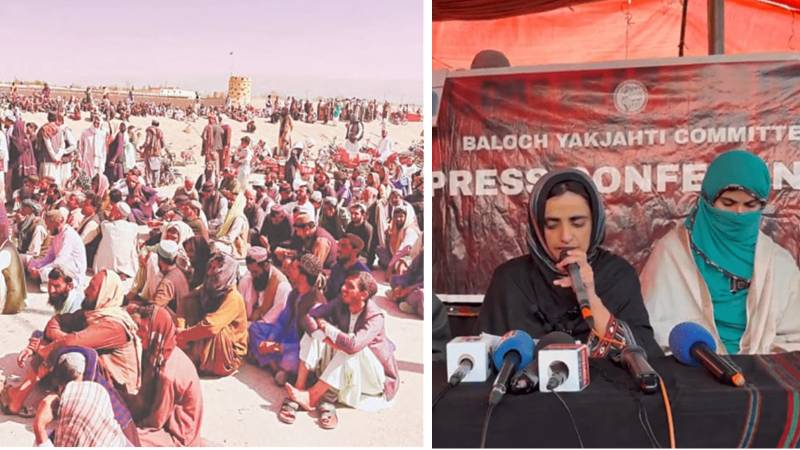
As election time approaches, the growing political frenzy has pushed the country into complete chaos. Pakistan faces a meltdown of its state institutions. The apex court’S recent controversial ruling depriving the PTI of its election symbol has stripped the elections of little legitimacy it was left with.
Meanwhile, in a parallel world two different protests are staged in by the disaffected youth of Balochistan.
Since two months, the residents of Balochistan are compelled to sing their songs of frustration, anger and helplessness against the state’s security-centric policies.
The sit-in protest in Chaman has entered its 95th day, drawing attention to the border restrictions which have caused major unrest in the border district and brought the system to a standstill.
The ongoing demonstration is attended by thousands of people despite the freezing temperature. It includes people from all walks of life demanding a return to the earlier system of border crossing, which allowed unrestrained cross-border travel based on local identification. The Chaman Sit-in highlights the daily hardships of families and tribes divided by a British-drawn Durand line.
It is nearing 100 days that a famine like situation persists in Chaman, thanks to the caretaker government’s harsh border policy.
Thousands of determined protesters demand that cross border movement must be resumed without any restrictions. The denial of unfettered border crossing for the local tribes of the border area is a violation of the Easement Right, the argue. This right was granted to those Afghan tribes that lived astride the Durand Line. As per the easement right, these people can move across the border without carrying a passport or visa.
In another sad state of affairs, in November, the killing of a Baloch man in a fake encounter sparked another protest. Thousands of Baloch men and women took to the streets in anguish. Scores of people came out on streets in Turbat marching all the way to Islamabad for their plea to be heard.
The collective anger of these Baloch youth and elderly represents frustration, alienation and resentment against the brutal repression of the state. The protesters peacefully marched towards the capital, yet again showing a strong resolve for peace, knocking on all doors – only to be sent back with impunity.
The state’s brutal reception of the young Balochs upon their arrival in Islamabad shows its unwillingness to rethink its strategy of dealing with Balochistan.
Security forces greeted the caravan of determined Baloch protesters fearlessly led by Dr Mahrang Baloch with a violent crackdown, baton-charged them, booked the protesters with sedition and dealt with them in the worst possible way. All that the protesters demand is to bring an end to unlawful practice of enforced disappearances, encounter killings and bringing to account those responsible for such acts of barbarity.
From even a cursory glance at the pages of our history, we find unbelievable miseries inflicted upon this part of the country. There is a history of extraction, dispossession and brutal repression as a state tactic to deal with the Balochistan challenge. Despite their broken hearts and decades of subjugation, the Baloch, by protesting peacefully towards Islamabad, expressed their faith in the federation and hoped that the state will, at the very least, offer a compassionate ear to their sad tales.
Pakistan unfortunately is not a role-model state for peripheries and religious minorities. They have remained on the receiving end of the state’s wrath since long ago.
The establishment and the ruling junta evince much interest in the natural resources, minerals and land of these peripheries – but couldn’t really care much about the millions living there. Unbridled militarisation, persecution of minorities, tampering with the constitution and alienation of the peripheries has remained the hallmark of our state.
The people who deny the existence of enforced disappearances turn a blind eye towards the kill-and-dump policy, even as they cry themselves hoarse over the sufferings of Gaza. It is strange that they prefer to remain silent on the sufferings of their own countrymen are bereft of empathy and humanity. The hottest places in hell are indeed, as ML King Jr very aptly put it, reserved for those who in a period of moral crisis maintain their neutrality.
Despite being rich in natural wealth, the people of Balochistan are forced to resort to inhuman forms of labour to make their ends meet. The province remains the most underdeveloped in the country and people can hardly afford two times meal.
Balochistan is treated as a modern-day colony, not as a beneficiary of constitutional developments, particularly the 18th amendment.
The use of brute force as a strategy has further cemented the distrust of an alienated population, pushing the educated youth towards radical elements.
Gone are the times when malevolent use of our ubiquitous security apparatus could stifle the voices of dissent. The youth of today is politically conscious and will not settle for anything short of access to their resources without the fear of being accused of posing a security threat.
Unfortunately, the country’s security establishment and the mainstream political parties are doing nothing to put a balm on the wounds of the disaffected population of Balochistan.
Safeguarding Pakistan’s coming generations requires serious efforts not just vote-garnering hollow claims divorced from the plight of the masses, particularly the oppressed nations.
It is long overdue for the state to rethink its strategy on Balochistan, and without any delay address the bottom line of the Social Contract, ie the State-Citizen relationship.

